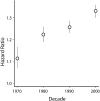Racial disparities in stage-specific colorectal cancer mortality: 1960-2005
- PMID: 20724684
- PMCID: PMC2936993
- DOI: 10.2105/AJPH.2009.184192
Racial disparities in stage-specific colorectal cancer mortality: 1960-2005
Abstract
Objectives: We examined whether racial disparities in stage-specific colorectal cancer survival changed between 1960 and 2005.
Methods: We used US Mortality Multiple-Cause-of-Death Data Files and intercensal estimates to calculate standardized mortality rates by gender and race from 1960 to 2005. We used Surveillance, Epidemiology, and End Results (SEER) data to estimate stage-specific colorectal cancer survival. To account for SEER sampling uncertainty, we used a bootstrap resampling procedure and fit a Cox proportional hazards model.
Results: Between 1960-2005, patterns of decline in mortality rate as a result of colorectal cancer differed greatly by gender and race: 54% reduction for White women, 14% reduction for Black women, 39% reduction for White men, and 28% increase for Black men. Blacks consistently experienced worse rates of stage-specific survival and life expectancy than did Whites for both genders, across all age groups, and for localized, regional, and distant stages of the disease.
Conclusions: The rates of stage-specific colorectal cancer survival differed among Blacks when compared with Whites during the 4-decade study period. Differences in stage-specific life expectancy were the result of differences in access to care or quality of care. More attention should be given to racial disparities in colorectal cancer management.
Figures




References
-
- American Cancer Society Cancer Facts and Figures for African Americans 2007-2008. Atlanta: American Cancer Society; 2007
-
- Chu KC, Tarone RE, Chow W, Hankey BF, Ries LAG. Temporal patterns in colorectal cancer incidence, survival, and mortality from 1950 through 1990. J Natl Cancer Inst. 1994;86(13):997–1006 - PubMed
-
- Irby K, Anderson WF, Henson DE, Devesa SS. Emerging and widening colorectal carcinoma disparities between blacks and whites in the United States (1975-2002). Cancer Epidemiol Biomarkers Prev. 2006;15(4):792–797 - PubMed
-
- Swan J, Breen N, Coates RJ, Rimer BK, Lee NC. Progress in cancer screening practices in the United States: results from the 2000 National Health Interview Survey. Cancer. 2003;97(6):1528–1540 - PubMed
Publication types
MeSH terms
LinkOut - more resources
Full Text Sources
Medical

